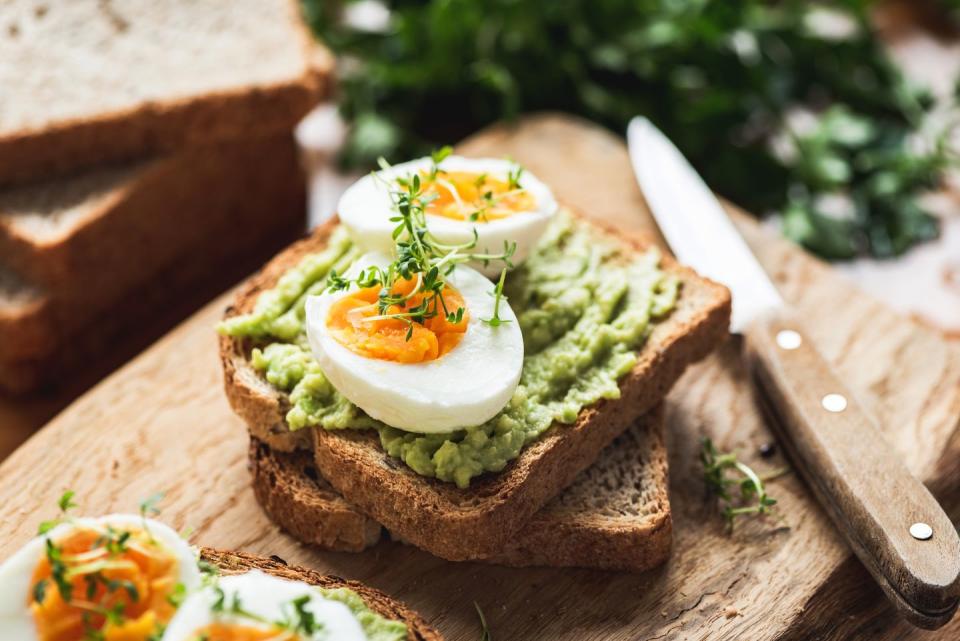Everything you need to know about the egg diet (including why it's not great for your gut)

Fried, boiled, poached or scrambled, the humble egg has had a rather tumultuous journey over the years – receiving both praise and criticism from health experts. ‘Pregnant women shouldn’t eat eggs’, ‘Eggs have high cholesterol levels’, ‘Eating an egg a day is bad for you’ etc etc. Thankfully, scientists now have a clearer understanding of the benefits of eating eggs – so eggs are a staple once again.
Rich in high-quality protein, eggs provide all nine ‘essential amino acids’ which are the building blocks needed to repair body cells and grow muscle, and contain more than 10 different vitamins and minerals as well as nutrients including potassium, calcium, iron, iodine, folate and vitamin D.
In fact, they’re considered such a nutritious item of food that an entire diet has been created around them. That’s right, the ‘egg diet’. Intrigued? So were we. Keep scrolling to find out more about this high-protein, low-carbohydrate diet centred around, well, eggs.
What is the egg diet?
There are various forms of the egg diet – you can choose to eat eggs for every meal (alongside other lean proteins and vegetables) or in extreme cases, limit your diet to just eating hard-boiled eggs and little else. Either way, following an egg diet is generally focused on weight loss and restricting calories.
‘This is very much a low carbohydrate, Keto diet,’ says dietician and director of City Dieticians Sophie Medlin, referencing a low-carb, high-fat diet that is designed to help people lose weight. ‘Often people try to bring in these new diets which are just low carbohydrate diets through the back door.’
The egg diet has started gaining traction on social media sites like TikTok, with people sharing their experiences of following the egg diet going viral. Perhaps you’ve even spotted internet personality Eddie Abbew on your ‘For You’ page who advocates eating up to 38 eggs a day...
But as the saying goes, you can have too much of a good thing and Medlin says this is certainly the case with the egg diet: ‘Eating one food exclusively is not healthy or balanced or a good way of managing your health,’ she says.
But aside from stinking out the office fridge, what does the egg diet actually involve?

What can you eat on the egg diet?
There’s no scientific research on this diet, so there are no guidelines on exactly how you should do it, but people sharing their experiences of the diet on social media generally eat a minimum of three hard-boiled eggs per day. This goes above the recommended range of 7-14 eggs a week – which is what Dr Carrie Ruxton, a dietician and adviser to the British egg industry, says is the ideal range.
More balanced, healthy versions of the diet incorporate food products like white fish, yoghurt and fruits like watermelon.
What are the health benefits of the egg diet?
As mentioned above, there’s no scientific research specifically on the health benefits of the egg diet, whether you’re eating eggs exclusively or making them the centre of your meals. Because this type of diet generally involves restricting calories, it might lead to some initial weight loss – eggs are high in protein, which promotes feelings of fullness and can help reduce overall calorie intake.
But, according to Medin, you’re unlikely to maintain weight loss with this type of diet, because its restrictive nature means it’s unsustainable and could lead to further health issues.
Are there any potential risks or side effects with the egg diet?
The main issue with the egg diet is its restrictive nature, which means you’re missing a lot of variety in the foods you’re eating. ‘You’re going to be very constipated, your energy levels aren’t going to be good and you’re missing out on some essential nutrients like Vitamin C, which will affect your immune system,’ Medlin says.
It could also have a negative impact on your gut health: ‘Limiting wholegrain carbohydrates is never a good idea from a gut health perspective,’ Medlin says. Eggs aren’t the best source of fibre, which means consuming only – or mostly – eggs could negatively impact your digestion.

How can you healthily incorporate eggs into your diet?
Although we don’t recommend trying the egg diet, evidence suggests eggs (when eaten in moderation as a part of a healthy diet) are nutritious and can help with appetite control, body composition and healthy ageing.
‘Eggs are one of the foods that contain lots of different nutrients because they’re essentially ready to become a baby chicken,’ Medlin says. ‘They contain really important B vitamins, important minerals and they’re a good lean protein source.’
In the past, people have worried about the cholesterol in eggs but Medlin explains that this doesn’t actually convert to cholesterol in our bodies, so this isn't something you should worry about. In fact, for most people, cholesterol in food has a smaller effect on cholesterol levels than the saturated fat in their diet.
So how many eggs should you actually be eating? ‘A healthy amount of eggs to eat is two eggs per day. If you're eating significantly more than that, you might want to have a look at the balance of your overall diet,’ Medlin recommends. Dr Ruxton agrees: ‘I reviewed the evidence and found the sweet spot was seven to 14 eggs per week, so one to two eggs a day.’
Read next:
Can sparkling water help you lose weight? Here’s what the research says
Processed red meat harms more than just your heart: it’s linked to dementia too
Urgent need for national strategy as NHS admissions for eating disorders surpass 30,000
Cut through the noise and get practical, expert advice, home workouts, easy nutrition and more direct to your inbox. Sign up to the WOMEN'S HEALTH NEWSLETTER
You Might Also Like


